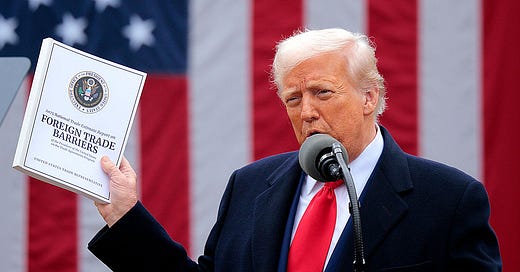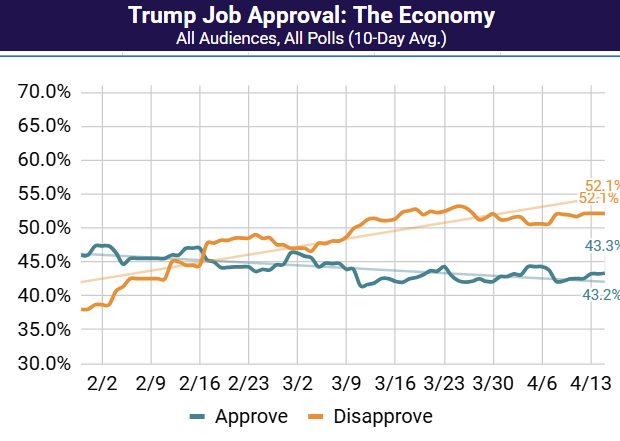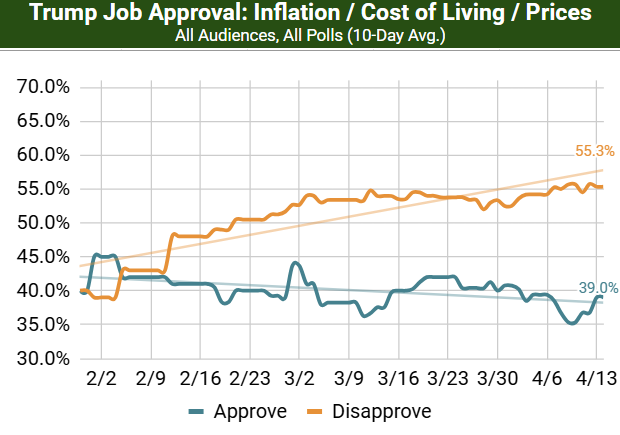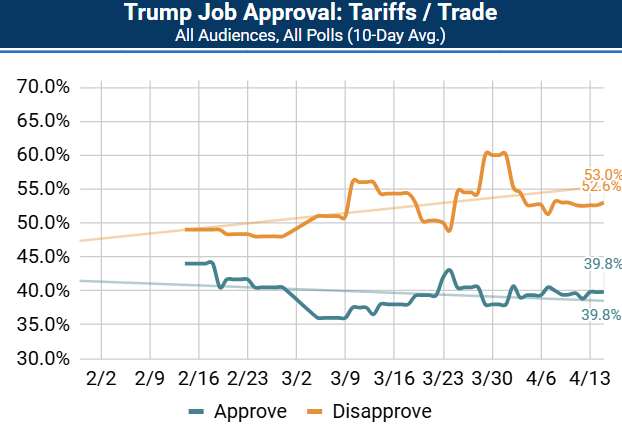The economy has long been one of Donald Trump’s biggest strengths as president. During his first term, many Americans viewed his stewardship of the economy highly favorably. At one point, fully 63 percent of Americans approved of his economic performance, including even one-quarter of Democrats. In both 2020 and 2024, voters who identified the economy as the top issue facing the country broke heavily for him, and one analysis found that inflation was likely a—if not the—top issue that swung this past election for him.
But all that appears to be changing. As Trump has moved to quickly implement his second-term agenda, Americans have begun to sour on his handling of the economy overall, and inflation and trade in particular. The pollster Adam Carlson has been tracking Trump’s approval rating on all three fronts, and this past weekend, a new CBS News/YouGov poll offered a more granular look at Americans’ views on a host of economic questions. The main takeaways: they’re worried Trump isn’t doing enough to combat inflation—and that his tariffs may exacerbate things.
Below are a few top takeaways from both sets of data.
The economy (overall)
The share of Americans disapproving of Trump’s handling of the economy has steadily risen since the start of his term while the share approving has fallen. As of this week, 43.3 percent approved of his economic job performance compared to 52.1 percent who disapproved—good for a net approval rating of -8.8. The 43.3 figure is lower than it was at any point in his first term pre-Covid.
According to CBS/YouGov, three-in-five Americans say they believe the economy is in “fairly bad” (30 percent) or “very bad” (29 percent) shape, and a majority (53 percent) say it is getting worse. This includes majorities or pluralities of every demographic sub-group measured with the exception of Republicans and conservatives. Importantly, 60 percent of independent voters agreed, as did a plurality (43 percent) of non-college whites.
Among those who said the economy is “fairly” or “very” bad, fully 79 percent say Trump is one of the reasons why. This includes the same share of independent voters, more than two-thirds (68 percent) of non-college whites, 43 percent of conservatives, and one-third (34 percent) of Republican voters.
A majority of Americans (54 percent) also now say that Trump’s policies are responsible for the state of the U.S. economy. By contrast, just 21 percent say Joe Biden’s policies are more responsible, and 20 percent say it’s both men equally.
Inflation
In Carlson’s approval tracker, Americans have rendered harsher verdicts on how Trump has handled inflation compared to the economy overall. As of this week, 55.3 percent disapproved versus 39 percent who approved, leaving him with a net approval on inflation of -16.3.
Like the economy overall in the CBS/YouGov poll, Trump’s standing with Americans on inflation has declined since the start of March. Whereas his net approval a month ago was just -8, it is now -20.
Fully 58 percent of all Americans believe Trump’s policies are causing food prices to go up, including 63 percent of independents, a plurality (47 percent) of non-college whites, and even 36 percent of Republicans.
Among the Americans who say the economy is in “fairly” or “very” bad shape, nearly all (96 percent) attributed inflation and high prices as a primary reason why—a striking reminder that these are among the top issues fueling discontent over the economy.
Tariffs/trade
The polling on Trump’s tariffs has been a little all over the place, but the basic trend lines show a similar trajectory here: the share of American disapproving of his performance has steadily grown, sitting at 53 percent this week, while the share approving has declined to 39.8 percent.
The overwhelming majority of Americans (75 percent) expect that Trump’s tariffs will cause prices to go up in the near term. The picture is somewhat more mixed over the long term, but a large plurality (48 percent) believe the outcome will be the same. Those figures are slightly lower regarding people’s perception of how the tariffs will impact the economy. Most (65 percent) expect a short-term hit, and a plurality (42 percent) believe the economy will be worse off in the long run.
When asked who will benefit the most from Trump’s tariffs, there is a general consensus: huge shares of Americans believe the top beneficiaries will be the wealthy (74 percent) and large corporations (71 percent). What’s notable is that even Republicans believe this by roughly the same margins. Less certain to reap the rewards? The working and middle classes (42 percent). Non-college whites, specifically, were only slightly more likely to believe these groups would benefit (53–54 percent) than not (46–47 percent).
One other nugget about trade and tariffs: Americans believe that trade is both good and necessary for the country to prosper. A large plurality (47 percent) say free trade has been good, including a plurality of non-college whites (44 percent). Meanwhile, a whopping 69 percent believe the U.S. should trade with other countries “for a lot of what it needs.” This included fully 60 percent of non-college whites and even 45 percent of Republicans. This mirrors other recent polling from Gallup showing that the most Americans, regardless of party affiliation, view foreign trade as an opportunity for economic growth.
However, the polling isn’t all bad for Trump right now. White non-college Americans, a group that is overrepresented in the crucial Rust Belt battlegrounds, generally still trust Trump. Currently, they support his tariffs by a 10-point margin, 55 to 45 percent, though they’re more split on whether they think the tariffs will cause an increase in prices over the long run (39 percent say they will while an equal share say they won’t). This cohort is also likelier than not to believe tariffs will help the economy (44 percent) than hurt it (34 percent) and say they’ll likely be able to judge the impact of these policies within the next year. Three-in-five also think tariffs will ultimately help bring manufacturing jobs back to the U.S. over the coming years versus just 17 percent who think it’ll lead to further manufacturing loss.
Additionally, CNN’s Harry Enten recently noted that Republicans under Trump have made big gains on a key survey question on which they have historically trailed Democrats: “Which party cares more for the needs of people like me?” He highlighted polling data indicating that in 1994, Democrats had a 19-point advantage on this question; in 2005, it was 23 points; as recently as 2017, it was 13 points. But today? The parties are tied, and the reason is massive GOP gains among the working class.
Of course, as we’ve written time and again, Trump’s appeal to many working-class Americans isn’t solely because of economic issues; culture matters too. But for many, their ultimate judgment of him looks likely to be based on how the economy fares—and whether they stand to benefit from his policies. Trump has some leeway for now, but if his trade and economic policies don’t pan out, it might give the struggling Democrats more ammunition to help stage a comeback.









The old adage of ‘It’s the economy stupid’ really stands the test of time. Unless the current economic policies of the Trump administration really do improve the economy, primarily by making stuff more affordable, Trump’s approval rating will continue to sag. Unlike some other issues where the media can influence views, like immigration and crime, people generally experience the economy on a daily basis and won’t be spun by the talking heads. I think this will end poorly for R’s because the current economic policies, especially around tariffs, are unlikely to help the economy and are more likely to raise prices without a commensurate economic benefit.
The Liberal Patriot's exceptionally refreshing and insightful journalism has become more than repetitively boorish and politically doctranaire when it comes to the snapshot in time known as polling; even accurate polling.
The damage done to and by American trade, tariff and industrial policy over the past 50 years made that "giant sucking sound" we continue to ignore at our own peril. The economically eviscerated rustbelt is one legacy of that folly. Visit a once economically vibrant Flint, Michigan or Dayton, Ohio for the stark evidence of this enduring decline.
Americans with a clearer understanding of this sorry economic trajectory, fostered under both past Democratic and Republican administrations, also understand that the devastation is not going to be undone overnight, and it can't be undone piecemeal.
Yes, the Trump Administration's remedies seem draconian, certainly compared to the smug and unsatisfactory statism of most of the past half century or more.
But reverse those past policies and eliminate or vastly reduce runaway trade and budget deficits isxa must. Most Americans almost certainly are willing and, frankly, have no choice but to give this Administration and Congress until the midterms -- the only poll that counts -- to show continued and preferably. escalating signs of progress.